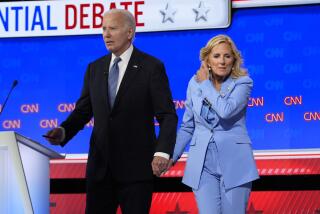Drink
- Share via
In the battle between Vice President Smart and Governor Nice, brains beat grin, especially after the man with the grin showed a bit too many fangs. George W. Bush clearly had done some homework in the last few days, but Al Gore has been doing a lot of homework throughout his career, and the difference showed in Boston last night.
Bush’s best bet for the last month of the campaign is to do what the first debate did not allow him to do, which is focus on a couple of big issues, leave the details to Gore and remind people that great presidents are not necessarily great at details.
Bush, clearly chafing at criticism of his tax plan and touchy about his past inability to keep his trillions and billions and millions straight, was well-prepped on that topic, at least. Of the next $25 trillion in federal revenues, he pointed out, his tax cut would “cost” the government a mere $1.3 trillion, or 5% of the total. And Bush was Gore-like in his ability to cite examples of the tax savings for working families.
Similarly, on Social Security, Bush was effective. “I want you to have an asset that you can pass on from one generation to the next,” he said, appealing to Americans who have figured out that while the government might keep you from the gutter, the private investment market can put you on Easy Street. And Bush even had a counterpunch: When Gore called his plan “Social Security Plus,” Bush shot back, “It’s not Social Security Plus--it’s Social Security plus huge debt.”
Indeed, on the overall issue of the size of government, Bush had some good, Republican-rallying stuff. Gore, he said, wouldn’t grow the economy so much as grow the government: 200 new programs, 20,000 new bureaucrats, $900 billion in more spending.
But the problem for Bush was that he didn’t have anywhere near 90 minutes worth of zingers and fun facts. Nor was he quick enough to pounce on some of Gore’s no-controlling-factual-authority assertions.
For example, Gore said: “The size of the federal government will go down in a Gore administration.” Do even the Gore-spinners believe that?
Unfortunately for Bush, the night was full of moments where Gore hooked him from both directions. On energy policy for example, the U.S. energy secretary, Bill Richardson, conceded that the Clinton-Gore administration had been “napping” as oil prices ran up. But Gore plowed ahead, promising to increase both production and energy conservation. What happened to the old Al Gore, the green guy who called for higher energy prices in his 1992 book and his 1993 economic plan? An uninquiring Bush didn’t want to know.
On prescription drugs, Gore clearly had a better handle on the details of not only his own plan, but also Bush’s. The Texan eventually did the only thing he could do, which is default back to the larger issue of the size of government. Anyone who sees prescription drugs for seniors--including the Spielbergs and the Streisands when they get old enough--as the critical issue is going to vote for Gore.
Bush’s plan does what the government should do, which is take care of the poor; Bush will just have to hope that most Americans see that they’re better off keeping their money in the first place and not choose to entrust it to Uncle Sam in hopes of getting it back as a benefit 20 or 30 years later.
When the question of financial crises came up, Bush was content to concede that Clinton and Gore had done well. But a quick challenger would have pivoted from money matters to national security, starting with the Somalia operation gone awry, the Pakistani A-bomb that took the administration by surprise and the recent congressional report that damned Gore’s own dealings with the Russians.
Bush has the makings of a Reagan-like profile; he could have played the genial Sunbelt governor with a shrewd understanding of human nature, who, not burdened with too many details, nonetheless could get things done. Instead, in unGipper-like style, Bush simply ragged on Gore, snarling: “This man has no credibility.”
That’s true: Gore doesn’t have a lot of credibility. But as Ronald Reagan knew when he took apart Jimmy Carter in their single presidential debate in 1980, acting easy-going is hard work. But the effort is worth it, because the reward is the White House, and that’s a prize to which Bush did not move closer last night.
More to Read
Get the L.A. Times Politics newsletter
Deeply reported insights into legislation, politics and policy from Sacramento, Washington and beyond. In your inbox twice per week.
You may occasionally receive promotional content from the Los Angeles Times.










